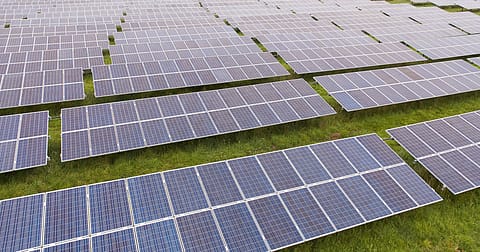PLI-II booster to power India's solar equipment self-reliance
India has a solar equipment manufacturing capacity of 24 gigawatt of modules and 6.4 GW of PV capacity and around 15-20 GW is under construction.

With the recent cabinet approval for an additional ₹19,500 crore funding for a production-linked incentive (PLI) scheme-II for manufacture of high-efficiency solar modules and with its tender processes going on, India is set to become self-sufficient in solar equipment manufacturing in a few years.
The country has a solar equipment manufacturing capacity of 24 gigawatt (GW) of modules and 6.4 GW of PV capacity and around 15-20 GW is under construction. India is eyeing an additional 40 GW of solar manufacturing capacity to come under the Solar PLI-II, which may trigger an investment of nearly ₹94,000 crore, with a goal of over 90 GW capacity by 2030. Until a couple of years ago, India's domestic solar equipment manufacturing capacity was less than 10 GW and nearly 80% of the total solar equipment needed for projects were imported from China.
“Year 2022 was a very eventful year for solar manufacturing. The country took more than 15 years to reach a module manufacturing capacity of 10 GW and in less than one year established over 30 GW’s and is marching towards reaching 100 GW", says Hitesh Doshi, Chairman & Managing Director, of Waree Energies, which has set up 9 GW of capacity and is now planning to increase this to 12GW by March 2023.
After restricting imports since April, the domestic manufacturers exported solar cells and modules worth $157 million (₹1,276 crore) in the third quarter of 2022, a 642% increase year on year, says a Mercom India data. Imports declined by 59% to $394 million (₹3,202 crore). India imposed Basic Customs Duty (BCD) of 40% for PV modules from 15 per cent earlier and 25% BCD for solar cells from April 2022. Further, the government came up with an Approved List of Models and Manufacturers (ALMM) to reduce dependence on China and to promote domestic manufacturing.
One major provision in PLI -II, announced in the Union Budget 2022-23, is to help the country develop its entire supply chain and integrated domestic manufacturing capacities. Out of the total approved amount, ₹12,000 crore is for vertical integration of raw materials-polysilicon-ingots-wafers-cells-modules (PWCM), ₹4,500 crore for ingots-wafers-cells-module (WCM) and ₹3,000 crore is for cells and modules (CM). The selected manufacturers are mandated to set up giga scale capacities and can avail the PLI benefits for five years. The scheduled commissioning dates for PWCM, WCM, and CM will be within 3 years, 2 years and 1.5 years respectively from the date of the Letter of Award.
In tranche -1 of PLI for the solar sector with an outlay of ₹4,500 crore, the winners were Reliance New Energy, Sai Electricals and Adani Infrastructure. Mukesh Ambani is setting up a Dhirubhai Ambani Green Energy Giga Complex over 5,000 acres in Jamnagar as one among the largest such integrated renewable energy manufacturing facilities in the world with an investment of ₹60,000 crore. Reliance Industries invested over ₹5,500 crore in 2022 alone to acquire technologies in new energy and its plans are to have 10 GW factories for solar cells and modules by 2024 and double the capacity in two years.
Adani group, which set up a GW scale solar equipment factory in 2016, ramped up capacities for PVs and modules from 1.2 GW in 2017 to 4GW in 2022. A few days ago, Adani Solar became the first producer of large sized monocrystalline silicon ingots in India at its new integrated facility in Mundra, with the silicon ingots factory coming up in just 7-8 months. The Adani group is setting up a Poly-silica 30000 tonnes per annum (TPA) plant, ingots & wafers of 10 GW capacity, a copper smelter of 500,000 TPA capacity and ancillary like glass & aluminium (10GW), all set to be operational within the next 1-2 years.
While companies like Tata Power Solar are doubling its cells and modules manufacturing capacity to 1,100 MW, ReNew Power is setting up solar modules manufacturing capacity of 6 GW. Established solar equipment companies like Vikram Solar are also expanding capacities.